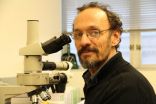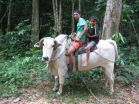(Press-News.org) EAST LANSING, Mich. - It's well known that chemotherapy helps fight cancer. It's also known that it wreaks havoc on normal, healthy cells.
Michigan State University scientists are closer to discovering a possible way to boost healthy cell production in cancer patients as they receive chemotherapy. By adding thymine - a natural building block found in DNA - into normal cells, they found it stimulated gene production and caused them to multiply.
The study can be found online in the journal Molecular Cell.
"In most cases, cancer patients who receive chemotherapy lose their fast-growing normal cells, including hair, nails and lining of the gut," said Sophia Lunt, a postdoctoral research associate who led the study along with Eran Andrechek, a physiology professor at MSU. "Therefore, it's necessary to understand the differences between normal versus cancer cells if we want to improve cancer therapy while minimizing the harsh side effects."
Thymine is made from sugar in the body and is necessary to make DNA. The research team wanted to understand how fast-growing normal cells metabolize sugar and other nutrients to stimulate growth compared to fast-growing cancer cells.
They were surprised to discover that when a shared protein, found in both normal and cancer cells, was removed from the healthy ones, it stopped growth. Previous studies have shown that deleting this protein, known as PKM2, from the cancer cells has no effect on cancer growth.
"When we deleted the protein, we found it caused healthy cells to stop making DNA," Andrechek said. "But when we added thymine, they began multiplying and producing DNA again."
Both researchers view this as a positive step in finding ways to boost healthy cell production, but indicate that more needs to be known on the effect thymine might have on cancer cells.
"Before we can look at using thymine as a possible treatment supplement during chemotherapy, we have to know if it has the same effect on cancer cells," Andrechek said. "We want to stop them from growing, not stimulate them."
Both Lunt and Andrechek in the College of Human Medicine hope the next phase of their research will help answer this question and also reveal more on what to target in order to stop cancer cell production.
"To selectively stop cancer growth while avoiding side effects including hair loss and vomiting, we need to identify a second target in cancer cells, in addition to PKM2, while providing normal cells with a supplement like thymine," Lunt said.
INFORMATION:
Matthew Vander Heiden, a cancer researcher at the Massachusetts Institute of Technology, also contributed to the study.
The research was funded by multiple organizations including the Department of Defense and National Cancer Institute of the National Institutes of Health.
Michigan State University has been working to advance the common good in uncommon ways for more than 150 years. One of the top research universities in the world, MSU focuses its vast resources on creating solutions to some of the world's most pressing challenges, while providing life-changing opportunities to a diverse and inclusive academic community through more than 200 programs of study in 17 degree-granting colleges.
MADISON, Wis. -- Frederick Crane was a researcher under David E. Green in the mid-1950s, during the early days of the University of Wisconsin-Madison Enzyme Institute, when he made his defining discovery.
The lab group was on a mission to determine, bit by bit, how mitochondria -- the power plants of cells -- generate the energy required to sustain life. What Crane found, a compound called coenzyme Q, was a missing piece of the puzzle and became a major part of the legacy of mitochondrial research at UW-Madison. But it was no accident.
"It was the result of a long ...
Montréal, December 11, 2014 - Researchers in Montréal led by Jacques Drouin, D.Sc., uncovered a mechanism regulating dopamine levels in the brain by working on a mouse model of late onset Parkinson's disease. The study, conducted in collaboration with Dr. Rory A. Fisher from the Department of Pharmacology at the University of Iowa Carver College of Medicine, is published online today by the scientific journal PLoS Genetics.
Using gene expression profiling, a method to measure the activity of thousands of genes, researchers investigated dopaminergic neurons in ...
WEST LAFAYETTE, Ind. - A new method that creates large-area patterns of three-dimensional nanoshapes from metal sheets represents a potential manufacturing system to inexpensively mass produce innovations such as "plasmonic metamaterials" for advanced technologies.
The metamaterials have engineered surfaces that contain features, patterns or elements on the scale of nanometers that enable unprecedented control of light and could bring innovations such as high-speed electronics, advanced sensors and solar cells.
The new method, called laser shock imprinting, creates shapes ...
A new study led by researchers at University of California, San Diego School of Medicine finds that the brains of obese children literally light up differently when tasting sugar.
Published online in International Journal of Obesity, the study does not show a causal relationship between sugar hypersensitivity and overeating but it does support the idea that the growing number of America's obese youth may have a heightened psychological reward response to food.
This elevated sense of "food reward" - which involves being motivated by food and deriving a good feeling ...
PORTLAND, Ore. -- A large international group of scientists, including an Oregon Health & Science University neuroscientist, is publishing this week the results of a first-ever look at the genome of dozens of common birds. The scientists' research tells the story of how modern birds evolved after the mass extinction that wiped out dinosaurs and almost everything else on Earth 66 million years ago, and gives new details on how birds came to have feathers, flight and song.
The consortium of more than 200 scientists is publishing its findings nearly simultaneously this week ...
A team of researchers led by North Carolina State University has found that stacking materials that are only one atom thick can create semiconductor junctions that transfer charge efficiently, regardless of whether the crystalline structure of the materials is mismatched - lowering the manufacturing cost for a wide variety of semiconductor devices such as solar cells, lasers and LEDs.
"This work demonstrates that by stacking multiple two-dimensional (2-D) materials in random ways we can create semiconductor junctions that are as functional as those with perfect alignment" ...
Agricultural decisions made by our ancestors more than 10,000 years ago could hold the key to food security in the future, according to new research by the University of Sheffield.
Scientists, looking at why the first arable farmers chose to domesticate some cereal crops and not others, studied those that originated in the Fertile Crescent, an arc of land in western Asia from the Mediterranean Sea to the Persian Gulf.
They grew wild versions of what are now staple foods like wheat and barley along with other grasses from the region to identify the traits that make some ...
GAINESVILLE, Fla. --- Nature abhors a vacuum, which may explain the findings of a new study showing that bird evolution exploded 65 million years ago when nearly everything else on earth -- dinosaurs included -- died out.
The study is part of an ambitious project, published in today's issue of the journal Science, in which hundreds of scientists worldwide have decoded the avian genome.
Edward Braun, an evolutionary geneticist at the University of Florida and the UF Genetics Institute, is one of the key scientists who took part in this multi-year project that used nine ...
(Santa Barbara, Calif.) -- With more and more rainforest giving way to pasture and grazing land every year, the practice of cattle ranching in the Amazon has serious implications on a global scale. At the same time, however, it provides a degree of socioeconomic flexibility for Amazonian smallholders who simply can't survive on what the forest or agriculture provide.
In a paper published in the current issue of the journal Human Organization, UC Santa Barbara anthropologist Jeffrey Hoelle takes a look at the rise of cattle ranching in the Brazilian state of Acre and the ...
Astronomers using the Atacama Large Millimeter/submillimeter Array (ALMA) may have detected the dusty hallmarks of an entire family of Pluto-size objects swarming around an adolescent version of our own Sun.
By making detailed observations of the protoplanetary disk surrounding the star known as HD 107146, the astronomers detected an unexpected increase in the concentration of millimeter-size dust grains in the disk's outer reaches. This surprising increase, which begins remarkably far -- about 13 billion kilometers -- from the host star, may be the result of Pluto-size ...


